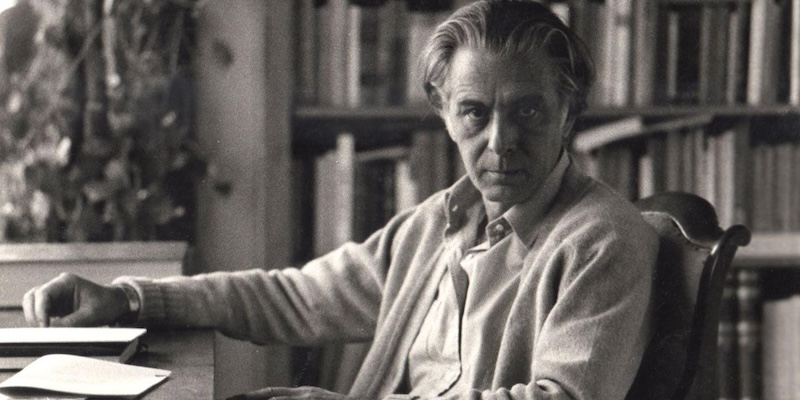The Secret Master: On Translating the Forgotten Argentine Writer Ángel Bonomini
Jordan Landsman Remembers the Writer Admired by Jorge Luis Borges, Alberto Manguel, and Others
I started translating the title novella in Ángel Bonomini’s first collection of short stories in 2016, before I’d finished reading it. I was twenty-six, and I’d been living in Buenos Aires for three years.
I’d come across “The Novices of Lerna” in an out-of-print anthology of twentieth century Argentine fantastic literature that also included tales by Bonomini’s more famous contemporaries Jorge Luis Borges, Silvina Ocampo, Julio Cortazar, and Adolfo Bioy Casares. The anthology, which I’d purchased in a used book store across the street from my first apartment in San Telmo, had cost me three pesos in 2013, when the peso was five to a dollar. Now it’s 876.
“The Novices of Lerna” is narrated by a young, unambitious lawyer, Ramón Beltra, who is summoned from Argentina to the fictional town of Lerna, Switzerland for a mysterious fellowship. The invitation is baffling, since Beltra has done nothing to deserve it, and disconcerting, because in order to qualify, he’s asked to photograph his body “partially and totally and from every angle imaginable.” The mawkish tone of the letters from Lerna rub Beltra the wrong way, but the benefits of accepting are too numerous to ignore.
Still, Beltra is loath to leave his daily routines in Buenos Aires. He has no higher calling, no drive to better his lot in life. “I know full well that it’s best to limit oneself to a tiny position in order to live in peace,” he says. “To become the registrar, the manager, the chief is to make the same deal as the toad who traded his eyes for a tail; goodbye to drinking two glasses too many, goodbye to staying up late reading, goodbye to friends, goodbye to women.”
This is about as far as I read before I started translating. This was eight years ago now, and the exact when and why of it all is a little fuzzy. All I know is that I immediately liked Beltra’s voice, and fresh out of a relationship and working an isolating remote job, I’m sure I identified with his ambivalence towards monogamy and gainful employment.
Considering how much time I ended up putting into this translation, it’s funny to me now that I started it on a whim.Considering how much time I ended up putting into this translation, it’s funny to me now that I started it on a whim. In 2016, most of my energy was going towards performing stand-up in Spanish and English. Most weeks, I was hosting The BA Comedy Lab, which is still running, and performing in another show called Limones, which is not. Before Bonomini, the only person I’d translated was myself.
If I’m being honest, part of me also started working on “The Novices of Lerna” as a way of tricking myself into finishing it. I love reading in Spanish, but as an English major I was trained to look up every word, and that takes a long time when it’s not your first language and the writer has a good vocabulary. Thankfully, as I translated, the plot thickened in ways that delighted me.
After a brief dalliance with a flight attendant, Beltra arrives at Lerna and discovers something shocking: there are twenty-three other fellows from around the world there, and they all look exactly like him. The university has convened them for a “secret project” that involves recording them surreptitiously while they study and interact with one another. Beltra has a hard time adjusting to the university’s bizarre and seemingly arbitrary rules, but then one by one, his doppelgangers start dying, and if I told you any more, I’d be giving too much away.
Around this time, I started asking my well-read Argentine friends if they’d ever heard of or read Ángel Bonomini. Their answer, almost invariably, was “Who?” Although he wrote almost a hundred and twenty stories across six dazzling collections, Bonomini is practically forgotten in Argentina. The few people I spoke to who did recognize his name seemed to remember him as a poet; in addition to the stories, Bonomini published seven books of verse, including one, when he was twenty-two, with his then-girlfriend, Maria Elena Walsh.
And although his original books are out-of-print in Argentina, I’m not the only foreigner who felt Bonomini deserved a wider audience. In 2015, the Valencia-based publishing house Pre-Textos republished a collection of his poetry, and in 2017 they released a thick volume of his collected short stories, which includes a terrific appreciation of Bonomini by the Columbian writer Dario Jaramillo Agudelo.
In 2018, I reached out to the Argentine writer Alberto Manguel, who edited the anthology where I’d found “The Novices of Lerna,” and was encouraged by his description of Bonomini as “a great writer, unjustly forgotten.” Bonomini’s, however, is not a case of someone only getting their flowers once they’ve started in pushing them.
In his lifetime, Bonomini won numerous awards and a Fulbright. “The Novices of Lerna” was admired by his contemporaries, Bioy Casares and Borges, and the latter selected his story “Iniciación del miedo” in a contest out of 2,700 applicants. (I don’t know how Borges found the time to evaluate twenty-seven hundred stories, but then again, the man really loved to read). Nevertheless, when Bonomini died in 1994 at the age of sixty-seven, his friend and mentee Marcelo Moreno wrote in a homage that he was a “secret master,” perhaps already sensing his fall into obscurity.
Even if my translation were to somehow succeed in making Bonomini a household name, “secret master” would still be a fitting title for him. There are secrets (and confessions) in nearly every one of the stories in The Novices of Lerna, and transmogrifying death is always around the corner. The narrator of “The Fire,” surveying the destruction he’s brought upon the church where he used to work, says “an ash-colored light rises from the river and my secret is sweet to me.”
In “By the Word”, an unnamed character wakes up one day trapped in a cube with “atrocious growths” that multiply every time he speaks. Nevertheless, he won’t stop talking: “He said a friend’s name. He said ‘carpenter’s bench’ because those were what he built for a living. He said ‘blue eyes’ for reasons that were secret.”
Even if my translation were to somehow succeed in making Bonomini a household name, “secret master” would still be a fitting title for him.I love Bonomini’s stories because they are truth-obsessed, and obsession-obsessed. There is a “too-muchness” to some of them (especially, “The Singer,” his stream-of-consciousness reflection on the death of the tango singer Carlos Gardel) that fits their subjects perfectly, but if I, at times made them torturous to translate. Sentence by desperate sentence, his stories can be overwhelming, and thematically, they keep circling back to murder, suicide, madness, and isolation.
This would have been too much for me, I think, if Bonomini’s stories weren’t also mordant and deeply moving, and if I hadn’t been helped and encouraged by so many friends and colleagues. Allison deFreese, whose translation workshop I attended in 2020, championed this project at every step of the way, and was extremely generous with her time.
I am eternally grateful to Adam Levy at Transit Books for taking a chance on this book. Having a good excuse to move back to Buenos Aires at the end of 2022 for a few months to work on it was a dream come true, and being able to share The Novices of Lerna with readers is another one.
______________________________

The Novices of Lerna by Ángel Bonomini translated by Jordan Landsman is available via Transit Books.




















